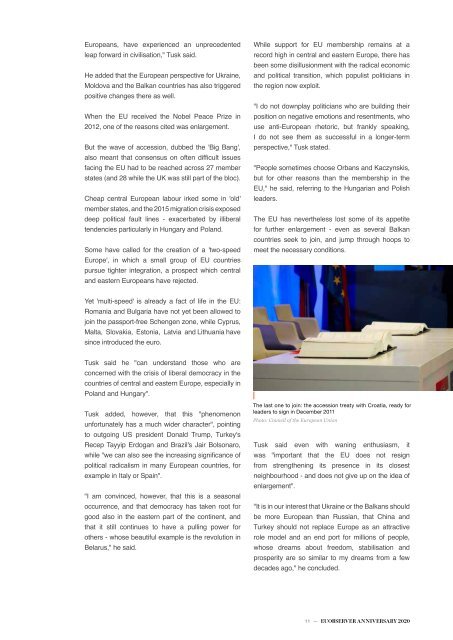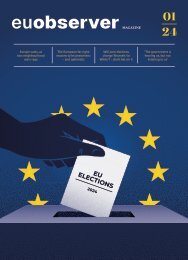20 years of European journalism & history
Twenty years doesn't seem a lot. Certainly not in the light of European history. But while we were writing this magazine for the 20th anniversary of EUobserver, we were surprised just how much happened in the European Union in those two decades.
Twenty years doesn't seem a lot. Certainly not in the light of European history.
But while we were writing this magazine for the 20th anniversary of EUobserver, we were surprised just how much happened in the European Union in those two decades.
You also want an ePaper? Increase the reach of your titles
YUMPU automatically turns print PDFs into web optimized ePapers that Google loves.
<strong>European</strong>s, have experienced an unprecedented<br />
leap forward in civilisation," Tusk said.<br />
He added that the <strong>European</strong> perspective for Ukraine,<br />
Moldova and the Balkan countries has also triggered<br />
positive changes there as well.<br />
When the EU received the Nobel Peace Prize in<br />
<strong>20</strong>12, one <strong>of</strong> the reasons cited was enlargement.<br />
But the wave <strong>of</strong> accession, dubbed the 'Big Bang',<br />
also meant that consensus on <strong>of</strong>ten difficult issues<br />
facing the EU had to be reached across 27 member<br />
states (and 28 while the UK was still part <strong>of</strong> the bloc).<br />
Cheap central <strong>European</strong> labour irked some in 'old'<br />
member states, and the <strong>20</strong>15 migration crisis exposed<br />
deep political fault lines - exacerbated by illiberal<br />
tendencies particularly in Hungary and Poland.<br />
Some have called for the creation <strong>of</strong> a 'two-speed<br />
Europe', in which a small group <strong>of</strong> EU countries<br />
pursue tighter integration, a prospect which central<br />
and eastern <strong>European</strong>s have rejected.<br />
While support for EU membership remains at a<br />
record high in central and eastern Europe, there has<br />
been some disillusionment with the radical economic<br />
and political transition, which populist politicians in<br />
the region now exploit.<br />
"I do not downplay politicians who are building their<br />
position on negative emotions and resentments, who<br />
use anti-<strong>European</strong> rhetoric, but frankly speaking,<br />
I do not see them as successful in a longer-term<br />
perspective," Tusk stated.<br />
"People sometimes choose Orbans and Kaczynskis,<br />
but for other reasons than the membership in the<br />
EU," he said, referring to the Hungarian and Polish<br />
leaders.<br />
The EU has nevertheless lost some <strong>of</strong> its appetite<br />
for further enlargement - even as several Balkan<br />
countries seek to join, and jump through hoops to<br />
meet the necessary conditions.<br />
Yet 'multi-speed' is already a fact <strong>of</strong> life in the EU:<br />
Romania and Bulgaria have not yet been allowed to<br />
join the passport-free Schengen zone, while Cyprus,<br />
Malta, Slovakia, Estonia, Latvia and Lithuania have<br />
since introduced the euro.<br />
Tusk said he "can understand those who are<br />
concerned with the crisis <strong>of</strong> liberal democracy in the<br />
countries <strong>of</strong> central and eastern Europe, especially in<br />
Poland and Hungary".<br />
Tusk added, however, that this "phenomenon<br />
unfortunately has a much wider character", pointing<br />
to outgoing US president Donald Trump, Turkey's<br />
Recep Tayyip Erdogan and Brazil's Jair Bolsonaro,<br />
while "we can also see the increasing significance <strong>of</strong><br />
political radicalism in many <strong>European</strong> countries, for<br />
example in Italy or Spain".<br />
"I am convinced, however, that this is a seasonal<br />
occurrence, and that democracy has taken root for<br />
good also in the eastern part <strong>of</strong> the continent, and<br />
that it still continues to have a pulling power for<br />
others - whose beautiful example is the revolution in<br />
Belarus," he said.<br />
The last one to join: the accession treaty with Croatia, ready for<br />
leaders to sign in December <strong>20</strong>11<br />
Photo: Council <strong>of</strong> the <strong>European</strong> Union<br />
Tusk said even with waning enthusiasm, it<br />
was "important that the EU does not resign<br />
from strengthening its presence in its closest<br />
neighbourhood - and does not give up on the idea <strong>of</strong><br />
enlargement".<br />
"It is in our interest that Ukraine or the Balkans should<br />
be more <strong>European</strong> than Russian, that China and<br />
Turkey should not replace Europe as an attractive<br />
role model and an end port for millions <strong>of</strong> people,<br />
whose dreams about freedom, stabilisation and<br />
prosperity are so similar to my dreams from a few<br />
decades ago," he concluded.<br />
11 — EUOBSERVER ANNIVERSARY <strong>20</strong><strong>20</strong>

















